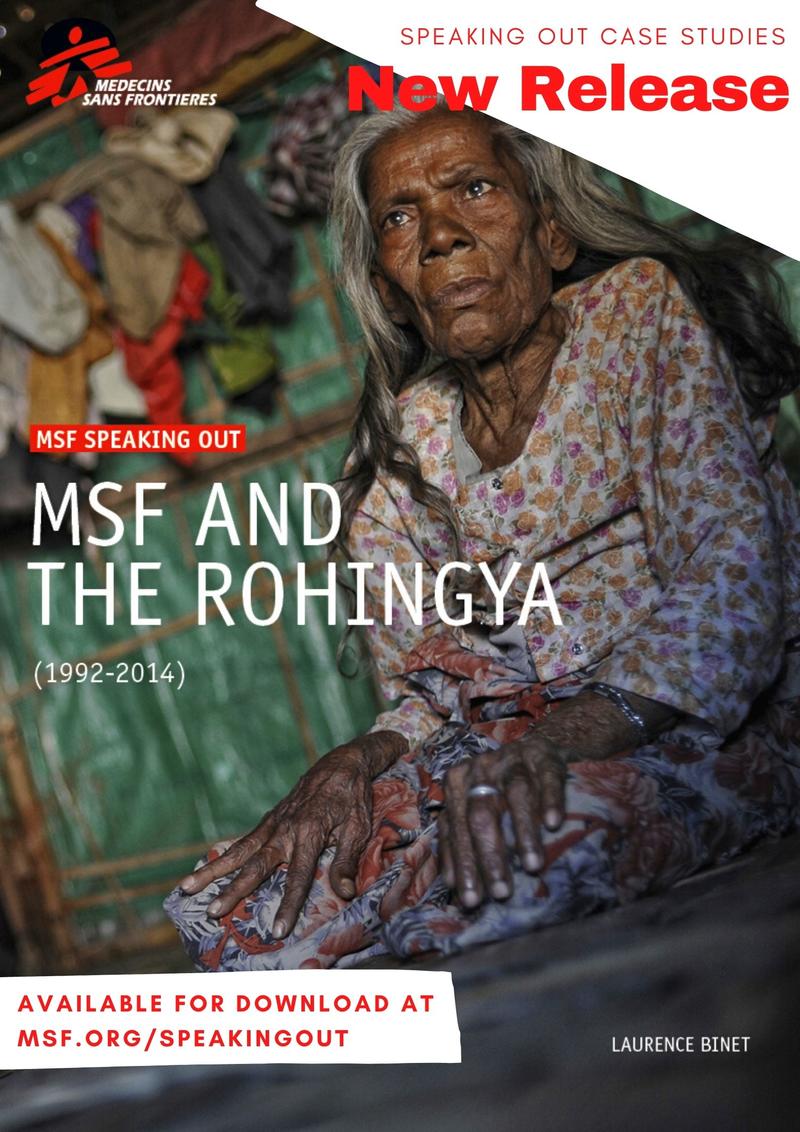Médecins Sans Frontières/Doctors Without Borders (MSF) releases a new Speaking Out Case Study: “MSF and the Rohingya, 1992-2014”. The case study brings to light two decades of MSF advocacy activities as part of its humanitarian assistance to the Rohingya people and explores the dilemmas the organisation was confronted with surrounding ‘speaking out’.
The case study “MSF and the Rohingya 1992 – 2014” is part of the MSF Speaking Out case studies (SOCS) series that analyses the organisation’s actions and decision-making processes during complex humanitarian interventions focusing on dilemmas surrounding speaking out.
The Rohingya are predominately a Muslim minority living in northern Rakhine state in Myanmar, a majority Buddhist country. Since the 1960s, the Rohingya have faced systematic persecution and violence by the military and the Buddhist Rakhine which led to massive displacements to neighbouring Bangladesh.
The new SOCS examines the difficulties the field and headquarters’ teams encountered surrounding the challenges for MSF to publicly speak out for the plight of the Rohingya facing persecutions and violence in both Myanmar and Bangladesh.
Would speaking out endanger operations?
During the period this case study covers [1992-2014], MSF worked mostly through diplomatic channels ‘behind closed doors’ to advocate for the Rohingya’s plight with foreign diplomats or UN agencies. Christos Christou, MSF International President explains: “MSF’s public silence was triggered by its fear of losing access to its patients including its large cohort of HIV/AIDS patients in Myanmar1. This created intense debates in MSF as the primary dilemma was posed: would taking a public position endanger operations in Myanmar and Bangladesh and lead to abandoning patients whose lives depend on MSF?
‘Silent advocacy’ for the Rohingya was strengthened over the years and several MSF reports were written and widely circulated to local and international stakeholders but not publicly released.
This ‘silent advocacy’ was challenged within MSF as a number of people in the organisation felt that MSF was abandoning a persecuted population through its public silence. The fact that no public witness of their plight was engaged despite the maintenance of an operational presence was not seen as an ethically justifiable option for an independent and impartial humanitarian organisation like MSF.
Fact-based, the case study reconstructs internal debates surrounding dilemmas
The case study illuminates the dynamics, dilemmas and internal disagreements underlying MSF’s humanitarian response to the Rohingya in both Myanmar and Bangladesh from 1992 until 2014.
“MSF has a strong tradition of debates. When facing complex humanitarian situations, we base our choices on internal confrontation of analysis, opinions and ideas. SOCS focus on crisis in which speaking out posed a dilemma for MSF and therefore, tell about the inevitable internal disagreements that happened when deciding the best way to overcome them. In a spirit of transparency, the MSF Speaking Out Case Studies have been made available publicly. Through this new case study, MSF brings to light the decision-making processes that have led the organisation to adopt a positioning on the complex Rohingya issue from 1992 to 2014. I believe it will be an interesting and useful read for MSF staff as well as other humanitarians and I hope it will help them build a stronger understanding and commitment to the act of speaking out which we, at MSF, consider essential.” concludes Christos Christou
The construction of each Speaking Out Case Study follows a strict methodology, which aims at establishing the historical facts. A compilation of extracts from primary source documents and interviews presents a chronological account of the events and positions adopted at the time.
Laurence Binet, the author of the MSF SOCS explains: “This fact-based approach enables the reconstruction of debates and dilemmas without pre-judging the quality of the decision made”. Binet adds: “We interview the main protagonists at the time of the crisis. Beyond fact-finding, these accounts provide a human perspective on the events and insight into the key players’ analysis”
The MSF Speaking Out Case Studies series transparently demonstrates the difficulty of addressing humanitarian dilemmas surrounding public positioning. Ready to share its unique experience with current and future humanitarian leaders to shape their knowledge, confidence and commitment to the act of speaking out, MSF makes all 13 SOCS available for download on its international website.



